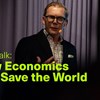articulate

How economics can save the world
Book launch for How Economics Can Save the World (Penguin, 2023) by Erik Angner, professor of practical philosophy and PhD in economics. Economics has always been shadowed by a movement that has been c

Salad Hilowle
Salad Hilowle (born in 1986, Mogadishu, Somalia) is a Stockholm-based artist who traces historical narratives, excavates and ponders the impact of the African diaspora on history and how it permeates
Simone Abram: Caring and sharing: Democratic imaginaries in question
Dr Simone Abram, Department of Anthropology, Durham University ABSTRACT Within the broad term 'democratic state' there is a messy set of imagined virtues, vices and possibilities. In this paper, I consi
Book talk: How Economics Can Save the World
Economics has always been shadowed by a movement called "anti-economics", denouncing its practitioners, attacking its assumptions, rejecting its conclusions, and protesting its influence. In his book H
Possible Worlds: Towards a New Imaginary
Venue: Uppsala Konsert & Kongress The internationally recognized philosopher Timothy Morton and innovation expert Michela Magas meet game designer Doris Rusch and futurist Karim Jebari in a captivat
Women in the Nordic Resistance Movement and their online media practices: between internalised misogyny and “embedded feminism”
Feminist Media Studies Abstract This paper is based on a case study of the online media practices of the neo-Nazi organisation, the Nordic Resistance Movement,conducted in the context of an ongoing proje
Belief Revision for Growing Awareness
Mind 130(520), 2021 Abstract The Bayesian maxim for rational learning could be described asconservative changefrom one probabilistic belief orcredencefunction to another in response to new information. ). But can this conservative-change maxim be extended to revising one’s credences in response to entertaining propositions or concepts of which one was previously unaware? The economists,) make a proposal in this spirit. Philosophers have adopted effectively the same rule: revision in response to growing awareness should not affect the relative probabilities of propositions in one’s ‘old’ epistemic state. The rule is compelling, but only under the assumptions that its advocates introduce. It is not a general requirement of rationality, or so we argue. We provide informal counterexamples. And we show that, when awareness grows, the boundary between one’s ‘old’ and ‘new’ epistemic commitments is blurred. Accordingly, there is no general notion of conservative change in this setting.








